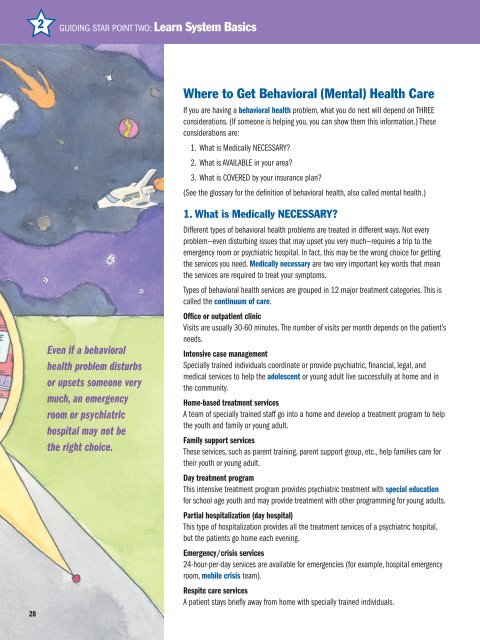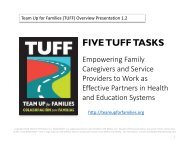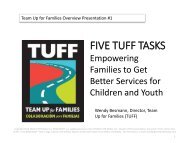Look Inside Young Adult Road Map
You also want an ePaper? Increase the reach of your titles
YUMPU automatically turns print PDFs into web optimized ePapers that Google loves.
2<br />
Guiding Star Point Two: Learn System Basics<br />
28<br />
Even if a behavioral<br />
health problem disturbs<br />
or upsets someone very<br />
much, an emergency<br />
room or psychiatric<br />
hospital may not be<br />
the right choice.<br />
Where to Get Behavioral (Mental) Health Care<br />
If you are having a behavioral health problem, what you do next will depend on THREE<br />
considerations. (If someone is helping you, you can show them this information.) These<br />
considerations are:<br />
1. What is Medically NECESSARY?<br />
2. What is AVAILABLE in your area?<br />
3. What is COVERED by your insurance plan?<br />
(See the glossary for the definition of behavioral health, also called mental health.)<br />
1. What is Medically NECESSARY?<br />
Different types of behavioral health problems are treated in different ways. Not every<br />
problem—even disturbing issues that may upset you very much—requires a trip to the<br />
emergency room or psychiatric hospital. In fact, this may be the wrong choice for getting<br />
the services you need. Medically necessary are two very important key words that mean<br />
the services are required to treat your symptoms.<br />
Types of behavioral health services are grouped in 12 major treatment categories. This is<br />
called the continuum of care.<br />
Office or outpatient clinic<br />
Visits are usually 30-60 minutes. The number of visits per month depends on the patient’s<br />
needs.<br />
Intensive case management<br />
Specially trained individuals coordinate or provide psychiatric, financial, legal, and<br />
medical services to help the adolescent or young adult live successfully at home and in<br />
the community.<br />
Home-based treatment services<br />
A team of specially trained staff go into a home and develop a treatment program to help<br />
the youth and family or young adult.<br />
Family support services<br />
These services, such as parent training, parent support group, etc., help families care for<br />
their youth or young adult.<br />
Day treatment program<br />
This intensive treatment program provides psychiatric treatment with special education<br />
for school age youth and may provide treatment with other programming for young adults.<br />
Partial hospitalization (day hospital)<br />
This type of hospitalization provides all the treatment services of a psychiatric hospital,<br />
but the patients go home each evening.<br />
Emergency/crisis services<br />
24-hour-per-day services are available for emergencies (for example, hospital emergency<br />
room, mobile crisis team).<br />
Respite care services<br />
A patient stays briefly away from home with specially trained individuals.














